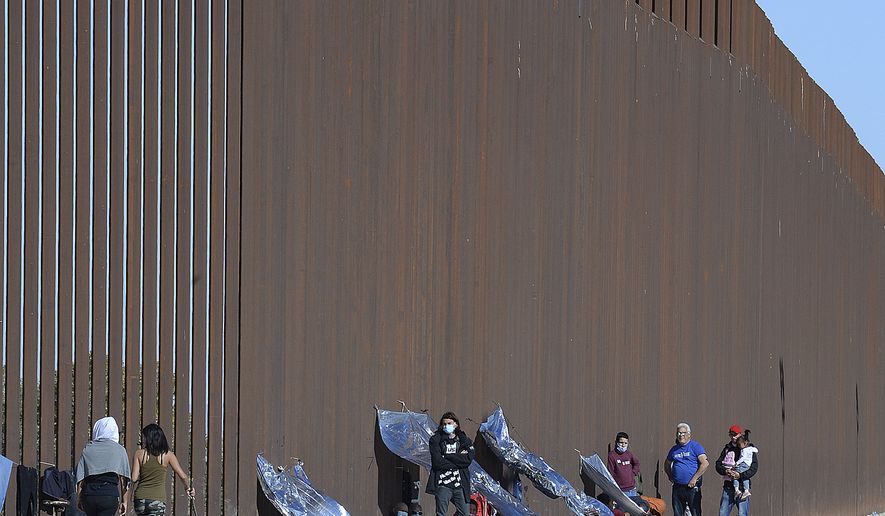The U.S. has had a massive surge in immigration this year, with as many as 1.5 million newcomers and a record 46.2 million foreign-born people, according to a report for the Center for Immigration Studies.
After a deep trough last year, likely because of the COVID-19 pandemic and the travel and migration restrictions imposed to control the spread, the flow of people rebounded around the time President Biden was elected.
In numbers never seen before, they are coming legally through airports and land border crossings and illegally across the Rio Grande and remote regions of Arizona and California.
“There was pent-up demand for legal immigration, and illegal immigration has exploded in one of the greatest surges, if not the greatest, we’ve ever seen,” said Steven A. Camarota, the demographer who was the chief author of the report. “It’s driving the numbers up and up and up.”
As it stands, 14.2% of the U.S. population is foreign-born, or 1 out of every 7 people. That is the highest rate of immigrants in the population since 1910, when the number was 14.7%. At current trends, the government says, the U.S. will break that record well before the end of this decade.
Those numbers are even starker given the reversal of trends.
SEE ALSO: Democrats in bind over amnesty as immigration groups demand payoff
The data showed a drop of 1.2 million immigrants from February to September 2020, likely the result of coronavirus restrictions blocking new entrants, even as outmigration continued. That left the population of the foreign-born — the Census Bureau’s term — at 43.8 million.
It was up to 45 million by January and marched steadily to the current 46.2 million total shown for last month.
In the year after President Trump’s election, the immigrant population flattened.
Mr. Camarota said that’s proof of how much a president’s rhetoric and policies can affect the flow of people.
Eventually, however, illegal immigrant caravans began to rush the border and the immigration population increased under Mr. Trump from late 2017 to early 2019.
One indication that the Biden border surge is playing a role in the numbers is the large increase in Hispanic foreign-born, Mr. Camarota said. They made up 61% of the growth over the past year.
SEE ALSO: Biden halts plan to pay illegal immigrant families separated at border
The Center for Immigration Studies used the Census Bureau’s Current Population Survey, a monthly sampling of households used to produce the Labor Department’s regular unemployment data.
The survey probes immigration status, allowing researchers to spot trends, though the sample size is smaller than tools like the American Community Survey, another census program commonly used to evaluate immigration. Current Population Survey data can show large variations month to month.
Because the CPS samples people actually in the U.S., it gives a different perspective of arrival, departure and arrest calculations, and can indicate trends in legal and illegal migration that official border records don’t reflect.
The most recent American Community Survey data dates to 2019. It found that more than half of immigrants had become U.S. citizens. Millions more are eligible to naturalize but have not attained citizenship.
That ACS data suggested that the illegal immigrant population was falling as part of a long-term trend.
Mr. Camarota said the latest CPS numbers suggest the situation is different now than in 2019.
He made the calculations as the Biden administration and Democrats on Capitol Hill are working to boost the flow of people and seeking to grant amnesty to illegal immigrants and open new avenues for more legal immigration.
Mr. Camarota said little attention is given to the country’s ability to handle the number of immigrants.
“The fundamental question on immigration that we don’t really totally seem to be able to ask, but which the numbers always raise, is what’s the right number? What’s the number we’re able to assimilate?” he said.
“The way politicians, policymakers, always approach it, especially in the Democratic Party, is how can we help more people get in or legalize those already here. Or in the Republican Party, how can we give the business community more foreign workers,” he said.
He said the numbers affect schools, health care providers and the labor market.
In 1970, the ratio of immigrants in the population was less than 1 in 20, the lowest since the census began tracking the matter in the 1800s.
As recently as 2000, the ratio was about 1 in 9. Now it stands at 1 in 7. Falling U.S. birthrates account for much of the shift.
Immigration and business advocates say that is reason alone to turn to immigration. They say the country needs the injection of workers to keep afloat the costly social insurance programs such as Medicare and Social Security. The trust funds of these programs face bankruptcy because of the drain of an aging population.
The American Business Immigration Coalition says immigration is also an answer to runaway inflation. It said passing Democrats’ immigration plans would help.
“This is going to kill us in the real world, with inflation and a lack of workers in almost every field — in hospitality and health care — everywhere, we’re hurting for workers,” Bob Worsley, co-chair of the coalition, said at a press conference last week urging congressional action. “They need to get this done.”
• Stephen Dinan can be reached at sdinan@washingtontimes.com.




Please read our comment policy before commenting.